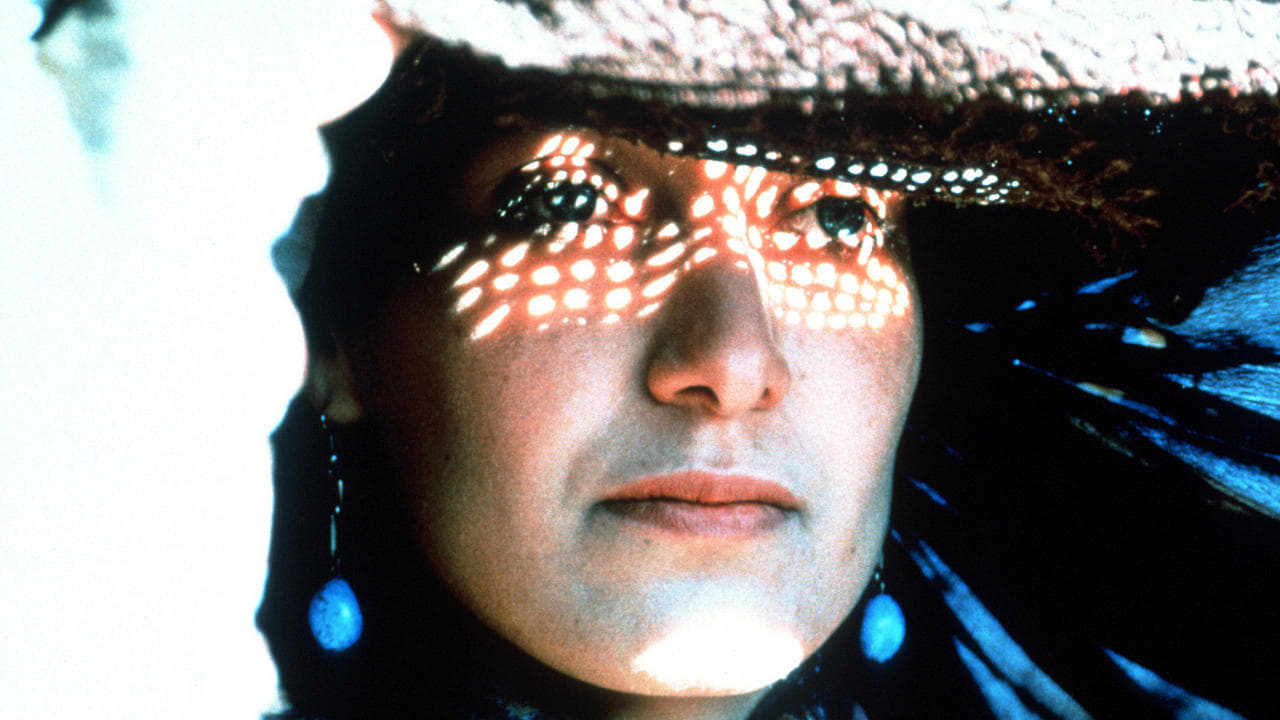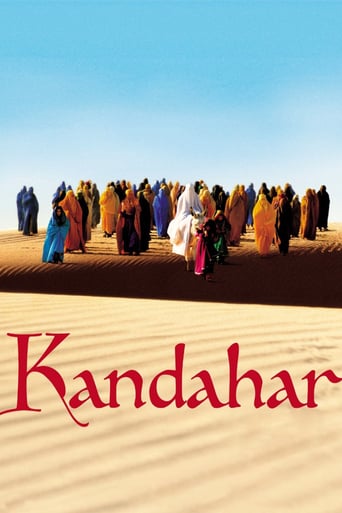CheerupSilver
Very Cool!!!
Helloturia
I have absolutely never seen anything like this movie before. You have to see this movie.
Mehdi Hoffman
There's a more than satisfactory amount of boom-boom in the movie's trim running time.
Celia
A great movie, one of the best of this year. There was a bit of confusion at one point in the plot, but nothing serious.
Red-125
The film Safar e Ghandehar was shown in the U.S. with the title Kandahar (2001). It was written and directed by the Iranian director Mohsen Makhmalbaf.Nelofer Pazira plays Nafas, a woman from Afghanistan who now lives in Canada. She travels to Iran, and then to Afghanistan, to help her sister. (Her sister is terribly depressed, and plans to commit suicide within a few days.) There's a very grim scene in Iran, when children returning to Afghanistan are taught to avoid picking up dolls, because they may be booby-trapped with explosives. Then Nafas crosses into Afghanistan with a group of returning refugees.The remainder of the movie--set in Afghanistan--makes the situation in Iran look idyllic. All the women wear the burqa (burka), so that we can't see them, and they have to see the world through a semi-transparent veil. Lawlessness abounds. Gunmen--I assume they are Taliban--roam the area and operate at will. Most horribly, people with amputated limbs are everywhere. There's a whole culture of amputations and artificial limbs, with more amputations from land mines every day.Nafas makes her way though this dangerous landscape in what is, in essence, a road movie. Although the people she meets are interesting--and sometimes generous and helpful--the situation is so depressing that it's hard to find any comfort while watching the film.This movie gives us a snapshot of what it would be like to be a woman--accustomed to living in North American--who has returned to a very different homeland from the one she left. The director is Iranian, so I don't know how authentically the scenes represent Afghanistan. My guess is that they are authentic, and that they portray a sad and horrible truth.We saw the film on DVD. I think it would work better in a theater. It's a great--if grim--movie, and it's worth seeking out and viewing.(Note that the director of Kandahar, Mohsen Makhmalbaf, is the director who is impersonated by the protagonist in the Kiarostami movie Close-Up.)
serabination
Safar e Ghandehar or the English translation "Kandahar" is an Afghani film expressing the long and difficult journey of an Arab American woman seeking her sister in through the Middle Eastern deserts on her way to Kandahar, the second largest city of Afghanistan. This film is regarded with praise as it holds awards, however, comparing Kandahar to American films, it stands as absolutely nothing special in the opinions of Americans, and in the opinion of my own. Kandahar is slow, repetitive, and holds no sentimental meaning. With the tension that is held between the United States and the Middle East, this film does not help the feud.Usually in stories, not just films, but in literature period, you have 7 structures to a good plot. There is the Leading character, an inciting incident that throws the main character out of balance, a objective for the character, obstacles in the characters way, a crisis which is the toughest obstacle for the character, a climax were the story is at its highest point, and a resolution where the action falls and the story is left at an end or at interpretation. All of these elements are essential for telling a story, now let's look at Kandahar. We are introduced to the leading female character as we learn she is thrown off balance by her sister who needs help, her objective which is to find and save her sister, obstacles where she has to travel though a dangerous dessert flooding with thieves. This is where the film ends, that is all this movie has to offer. Did she find her sister? We don't know many Arab films have open endings because they believe that life is a journey and should always be left open. In my opinion that is absurd and stories of that genre are rubbish. As far as I know every journey I've ever been through has an end, but life can still continue even if a journey such as High School or a show production ends. I cannot decipher why these filmmakers would do this. I just wasted and hour of a half of my life that i will never get back in watching half of a movie. That is like watching Star Wars and the movie is turned off before the X-wings enter the Death Star trench. That is like ending Citizen Kane without showing the audience the Rosebud sled. The film get's the audience into these characters and awaits some kind of crisis that would lead to the climax and resolution, but instead we are left with an unfinished film. Unless if there is a Kandahar 2 (god forbid), this film serves no purpose. The leading characters sister wanted to commit suicide in the film, I don't blame her, I wan contemplating killing myself half way through this film too.I cannot help but express my feeling towards this atrocious film, let alone writing an essay about it. America has made some pretty bad films, but few of them compare the animosity of this example of an Arab film. I'd rather watch Ed Wood films without a companion to tell jokes too. I'd rather watch an edited copy of the Star Wars prequels that only show the scenes with Hayden Christiansen. I'd rather watch the extended directors cut of Dune. I'd rather watch the dance sequence in Spider-man 3 over and over again . If my life were a movie, I'd call up Doctor Emit Brown and borrow his DeLorean so I can drive 88 miles per hour, go back in time, and prevent this film from ever being made. No one on this earth, that includes criminals and terrorists deserve the torture of watching Kandahar, and anyone who shows this film is the meanest and most sadistic individual on the face of this green earth. Watching this film in class made me happier that I have changed my major to theater so I can never run any risk of being forced to watch such a terrible movie ever again.
amb5-1
A poster wrote "There is one remarkable scene wherein hordes of desperate, one-legged men hobble on crutches across the desert as Red Cross helicopters rain prosthetic limbs down onto the sands below". Well, the scene was total B***S***! The Red Cross has worked in Afghanistan for nearly 30 years and for probably half that time has had the world's largest orthopaedic programme. Each and every limb is made to fit for each person and then there are weeks of rehabilitation in one of the many well equipped orthopaedic centres around the country after the limb has been fitted. There is no need to buy and sell them on the black market because they are free of charge to anyone who needs one. Always have been and always will be. There is also no way on earth that the Red Cross ortho programme has ever been run out of tents in the desert and absolutely no way the Red Cross ever dropped double prosthetics out of helicopters or planes. The entire scene is an insult to the Red Cross. And before you howl me down I have been working in Afghanistan and have seen the work done by the Red Cross before, during and after the rule of the Taliban. The writer, producers and directors should be ashamed of themselves.
sandoak
I was moved by the beauty brought to a situation of suffering and tragedy. As our protagonist struggles to find her sister, the horrors of postwar Afghanistan are revealed through simple encounters with a variety of people with struggles of their own. The pacing, which may seem tedious to folks used to fast action, allows a lyrical visual beauty to arise where another filmmaker may have shown chaos. In turn, this lyrical beauty creates a stillness where compassion begins and grows. What was distant & abstract becomes close & personal. We're shown a perspective on war that is at once starkly simple and deeply caring. I also enjoyed the taste of Persian culture. The legacy of Hafiz, Rumi & other great Persian poets flavors the vivid poetics of Makhmalbaf's cinematography, dialog, and plot structure. Quite a taut alternative to our American viewpoint.

